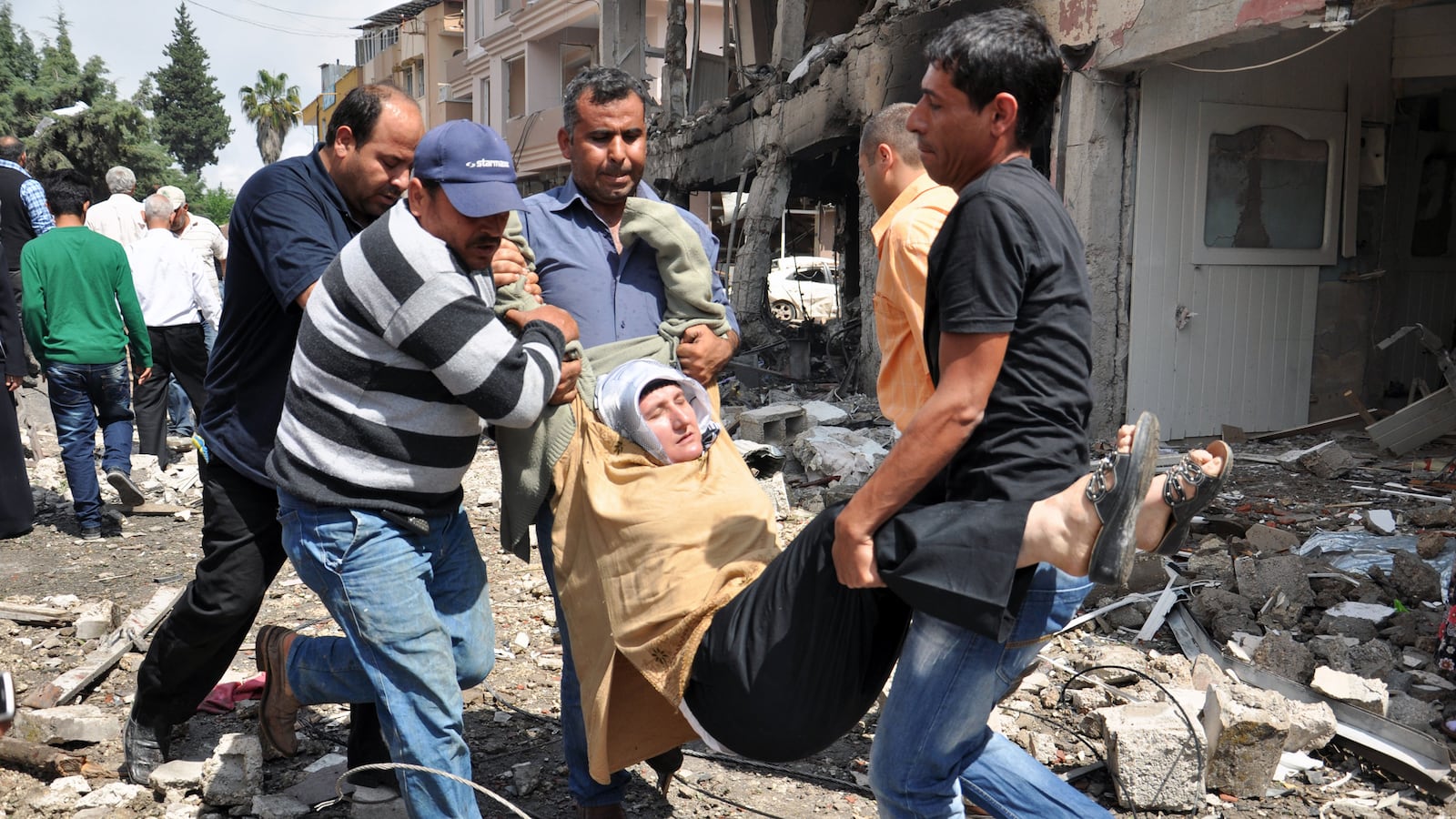Two car bombs rocked the Turkish border town of Reyhanli on Saturday in what officials suggested was an unprecedented spillover of violence from the Syrian civil war. The blasts killed some 40 people and wounded more than 100, inflaming tensions in an area already badly strained by the conflict raging just miles away.

No one immediately claimed responsibility for the attacks. But many of Reyhanli’s Turkish residents suspected that a faction from the Syrian conflict was likely to blame, and some quickly turned on the Syrians who have flooded the town seeking refuge over the last two years. “It was like heaven here,” one man shouted to bystanders from the stoop of a battered pastry shop near one of the blast sites. “Now they turned it into hell.”
The powerful blasts hit the center of town, with one detonating near an administrative building and another in a main square, shattering windows for blocks. Turkish authorities poured into the small town to cordon off the sites, with riot police keeping the crowds away. Many of the town’s Syrian residents fled.
One, Mufida Anteer, who teaches at a school and culture center for displaced Syrians, said a mob had descended on the building shortly after the blasts, breaking through the windows and then attacking the terrified people inside. She and the other Syrians managed to escape into a nearby car whose windshield was smashed by a rock as it sped out of town. Turkish youths were standing sentinel at the wrecked schoolhouse later Saturday afternoon.
Turkey has been one of the Syrian revolution’s most muscular foreign backers. It hosts around 200,000 refugees in camps near the border, according to government figures, and has long provided safe haven for the opposition—both officially with political and rebel leaders headquartered in Turkey, and unofficially as rebels and activists make regular passage across the border. Reyhanli, which sits near a key border crossing into Syria, is a hotbed of revolutionary activity.
As the civil war in Syria has spiraled, with more than 70,000 people killed in the fighting so far, Turkey has started to feel some of the deadly side effects. Stray artillery shells have landed on the Turkish side of the border, with the Turkish military occasionally returning fire—a Syrian government shell killed five Turkish civilians in the most notorious incident last fall. Then, in February, a car bomb killed 14 people in the no man’s land at the border crossing near Reyhanli. Turkish authorities later arrested five people allegedly tied to the Syrian government.
After Saturday’s attacks in Reyhanli, Turkey’s deputy prime minister said that the Syrian military and intelligence were the “usual suspects,” though he stopped short of assigning blame. If the bombings are indeed related to Syria, they would mark the most deadly fallout that Turkey has experienced from the conflict. Speaking on Turkish television, Recep Tayyip Erdogan, Turkey’s prime minister, said that the death toll is likely to rise as victims succumb to their injuries. Erdogan also suggested that the attacks could be an effort to thwart the Turkish government’s fledgling peace process with its Kurdish rebels.
Erdogan has been a strident proponent of international intervention in Syria, pushing hard for a no-fly zone while sounding the alarm of the potential for spillover into the NATO power. The attacks came ahead of Erdogan’s high-profile visit to Washington next week, in which Syria is already expected to dominate the agenda. Soner Cagaptay, the director of the Washington Institute’s Turkish Research Program, says that the bombings will likely add weight to Erdogan’s push to get the Obama administration to take stronger action on Syria. “This adds to Turkey’s sense of urgency and will increase the pressure on the president next week to do something to show support to Turkey,” Cagaptay says.
Speaking to reporters in Berlin, Ahmet Davutoglu, Turkey’s foreign minister, warned of repercussions from Turkey once it determines a culprit for the attacks. “Those who for whatever reason attempt to bring the external chaos into our country will get a response,” he said.
Orhan Dormusoglu, who owns a pet store in Reyhanli that was badly damaged in the blasts, worried that the attacks were meant to sow discord between the Turks and Syrians in the area. On the street outside his shop, groups of Turkish youths with sticks tried to determine whether passersby were Syrian, and cars bearing Syrian license plates had been vandalized.
Dormusoglu said he’d been employing and sheltering Syrians since the revolution began and vowed not to stop. He worried, though, whether others in town would feel the same. “I’ve always helped Syrians, and this won’t change my way of dealing with them,” he said. “But what happened here I think will cause problems for a long time.”
With Mahmoud Hassino





